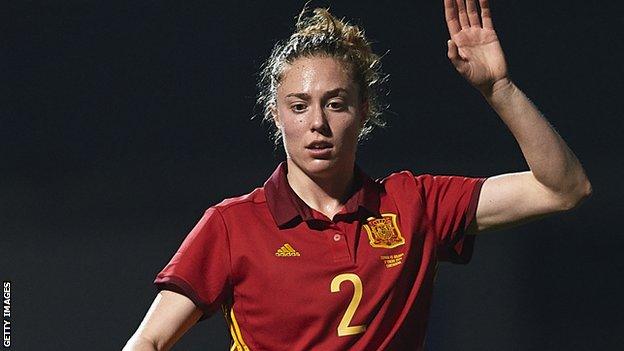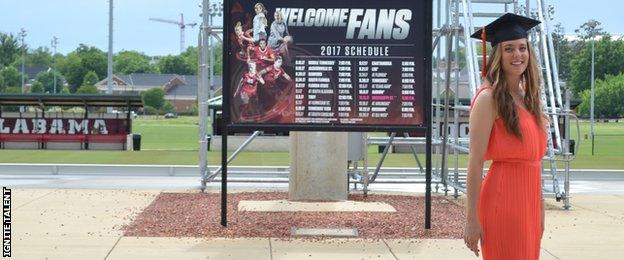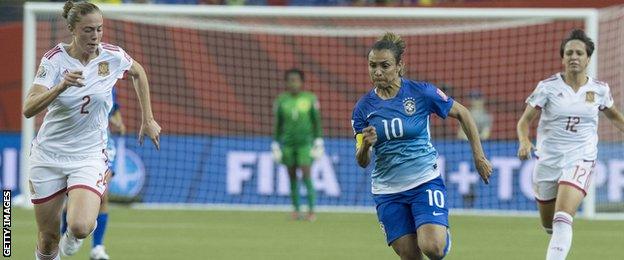Celia Jimenez Delgado: Spain’s rocket scientist shooting for World Cup glory
- Published

Celia Jimenez Delgado played in all three of Spain's group-stage matches at the 2015 World Cup
If you ask most international footballers about fluid dynamics, ductility or Newton's laws of motion, they will probably look back at you with an expression as vacant as one of the largest voids in the universe.
Not so with Spain right-back and 'rocket scientist' Celia Jimenez Delgado, who has a degree in aerospace engineering from the University of Alabama and will be on a mission with her country at the upcoming Women's World Cup.
After helping propel 'La Roja' to qualification for only their second World Cup finals, the 23-year-old is part of the Spanish squad preparing to face England at Swindon's County Ground on Tuesday (19:00 BST), as the build-up to this summer's tournament in France continues.
"On the day of a game we always do a little brainteaser to get the mind going, and if it's something numerical everyone gives me a look, asking 'what do we do, what's the plan?'" Jimenez told BBC Sport.
"As a kid, I was building stuff at home all the time, and I always knew I wanted to study engineering because I love designing and finding solutions for unsolved problems.
"But even though football and aerospace engineering might look like two different fields and concepts, they are actually really related, because in both you need to keep working hard even if you don't see the results at the first moment.
"If you have a bad day, you still need to wake up and try again. The values that you learn from one can definitely be applied to the other."
Jimenez, who was playing top-flight football in Spain by the age of 15, pursued college football while studying for her degree before playing in the Women's Champions League with Swedish side Rosengard in 2018.
Asked what she most enjoyed about her university studies, she replied: "One of my favourite topics was compressible flow, where you study how the flow has behaved and the differences in pressure. It's hard to explain without getting too deep!
"It was difficult to manage my time because I was also playing with the national team, which meant I had to fly back and forth between the USA and Europe, and I would miss a good amount of classes that later I needed to study by myself.
"So it took some extra work but I am really, really happy that I did it and I can now say I have my degree already finished."

Jimenez has a degree in aerospace engineering from the University of Alabama
Jimenez, who is hoping to secure an engineering role involving project management once her football career ends, will make her debut in the American NWSL in April, after realising the "dream come true" of signing for Seattle Reign, where she will play alongside stars including Wales legend Jess Fishlock.
"It is honestly impossible to describe with words how I felt, when Vlatko [head coach Vlatko Andonovski] gave me a call and told me he was interested in drafting me. My tears came on and I got really emotional.
"We have some of the top players in the world and I'm honoured to play with them. When they said my name in the draft ceremony, it was a moment I can never forget."
'England are a great rival'
On Tuesday, Jimenez and her Spanish team-mates face the Lionesses, who are bidding to bounce back after Friday's loss to Canada.
Phil Neville's hosts - who are without injured captain Steph Houghton and goalkeeper Carly Telford - will be up against a Spanish side that beat Brazil on Friday, after impressive results including a victory over the European champions, the Netherlands, at February's Algarve Cup.
"England are a great rival. Playing them is realistic with the level that we're going to find in the World Cup," Jimenez continued.
"It's going to be a great match and all these friendly games are crucial for the World Cup. We can test how we are doing and work on some other combinations and gameplans."

Jimenez played against Fifa World Player of the Year, Brazil's Marta, at the 2015 World Cup
Ranked 13th in the world, Spain will hope to win a match at the finals for the first time, having been eliminated in the first round four years ago.
They have been drawn in an intriguing-looking Group B - alongside Germany, China and South Africa - with all four teams knowing that whoever finishes second would be on course to face the winners of a group featuring the holders, the USA, in the round of 16.
"It's definitely a difficult group," Jimenez said. "All those countries have been doing a really good job developing soccer.
"We just want to pay attention to the first game, those 90 minutes are crucial. We've been waiting for this moment since 2015. We have learned so much in the years since that World Cup."
'No limits' for Spanish women's football
Spain begin their campaign against South Africa on 8 June in Le Havre, before facing Germany in potentially one of the biggest contests of the group stage.
But regardless of whether or not Jimenez's side are successful this summer, the wider Spanish women's game has already reached lift-off in the past 12 months.
Firstly, Spanish youth international sides reached at least the final of every major youth women's competition in 2018, including success at the European Championships for the under-19s, while their under-17s became both world and European champions.
Then a crowd of 60,739 watched one of this year's Women's Champions League semi-finalists, Barcelona, beat Atletico Madrid at the Wanda Metropolitano in March, setting a modern-day European record for a top-flight domestic women's game.
"It definitely was a big statement. With the right marketing, time, date and stadiums, women's soccer can attract big crowds and this proved it," Jimenez said.
"The game is growing exponentially and, if we have access to the right opportunities, media coverage, facilities and investments, I am sure we have no limits.
"Our [international] youth teams' success is a sign that we are doing things right. I'm excited to see how these players grow in the future.
"In general, women's sports teams in Spain have been getting really good results even though they don't have the same economic resources or facilities.
"So it's time for us to really start changing things, getting more help from the institutions, because if we all push in the same direction, we can assure the younger generation of females that, yes, they can become a professional competitive athlete, just the same as they can be a successful engineer."